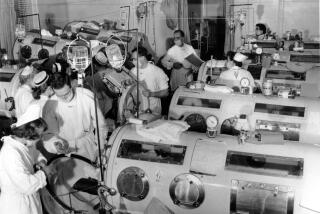Lack of Experts Means Patients Call the Shots
WASHINGTON â After 22 days of Cipro, an editorial assistant at American Media Inc. couldnât stomach it anymore.
The nausea and cramps had her eating little more than rice cakes. Her personal physician was perplexed--he had never seen a case of anthrax in his career, so how could he advise her? He sent her to the local health department, which gave her an alternative antibiotic.
âWhat do the doctors know?â the 44-year-old woman said with resignation, insisting on anonymity. She and hundreds of others at the Florida publishing company where anthrax claimed its first fatality in the current outbreak are trying to get on with their lives, even while a course of preventive treatment has left a lot of them feeling lousy.
Amid a whirl of vague and ever-changing medical advice, the legion of workers who might have been exposed to the deadly bacteria are calling their own medical shots.
The experts the nation has come to count on for a firm plan in a public health emergency are baffled, and thousands of people on the receiving end of care have come to conclude that they are somehow on their own.
âWe are the guinea pigs,â the editorial assistant said. âI went to the board of health yesterday, some of my colleagues are going today, others are not going at all. Itâs a private decision.â
Some doctors say their four years of medical training included 10 minutes on anthrax. No one is sure who has been exposed to the deadly bacterium, much less who should be treated. That mystery deepened Wednesday with the death of a New York hospital employee who--not having been required to handle mail in the course of her work--may be the first average citizen infected with the pulmonary form of the disease, the most deadly.
âWe went through all these blood tests and nasal swabs, and the results are still uncertain in terms of determining who was really exposed and who wasnât,â the American Media employee said. âSo if they donât know that, how can they know 60 days of treatment will help either? We arenât idiots.â
Hearing mixed signals, colleagues working side by side in places of potential exposure are following varied courses of treatment. Mail room employees at companies that sort bulk mail are instructed to take antibiotics; secretaries who open the mail are not.
As frustrating as the situation is, experts say patients should not ignore medical advice. If some patients take antibiotics, even though they arenât at risk, they could be contributing to antibiotic resistance in the community.
And if at-risk patients donât take antibiotics, as recommended, they could place themselves at risk of an anthrax infection.
âI donât know how much more clearly to say this: If you really are in a risk group, you donât want to get inhalation anthrax. You donât want to get sick with this stuff,â said Dr. Ivan Walks, the District of Columbiaâs chief health officer.
Even in firms that handled mail that passed through Washingtonâs Brentwood mail processing center--where traces of anthrax were rife and two workers died--not all mail handlers have chosen to follow the governmentâs treatment guidelines.
Ronnie Griffin has worked as a mail handler for the Washington law firm of Wiley, Rein & Fielding for five years and says he has no worries about handling crate after crate of mail that comes in each day. He and his co-workers have been advised to take antibiotics; surgical gloves were made mandatory. But Griffin remains defiant.
âI feel fine. I have no symptoms, no sores,â he said. âI have better things to worry about right now. I really donât think about anthrax.â
Yet thatâs all Sherman Watson thought about as he stood in line at D.C. General Hospital on Wednesday for his second course of antibiotics, this one for 60 days. A mail processor at Brentwood, he was best friends with Joseph Curseen Jr., one of the two who died of inhaled anthrax. They met about six years ago in machine automation, read the Bible together and carpooled to work.
âThis stuff is not to be played with,â Watson said with tears in his eyes. âLife is so precious. I hope no one else has to die.â
But few are as certain of the proper course to take. While a nervous public begs physicians for anthrax drugs, others are turning prescriptions away.
A survey of Kaiser Permanente members who worked at Brentwood underscored the level of misunderstanding. One woman was âsavingâ her supply in the event she developed symptoms--when the disease is far more difficult to cure.
Another woman neglected to take hers because she feared they would interfere with her birth control pills, said Susan Whyte Simon, spokeswoman for Kaiser Permanente of the Mid-Atlantic States in Maryland, which has been doing patient outreach to monitor the antibioticsâ effects.
Even those who seek clarification often do not find it. Within one hour, members of the Washington-based environmental group Friends of the Earth sought advice for their staff, placing two separate calls to the local Department of Health, which recommended antibiotics for thousands of bulk mail handlers last week.
They received two different answers--one suggested a course of antibiotics and an anthrax test; another assured that no precautions were necessary.
Those considered at risk have little recourse but to decide for themselves.
Many patients who have nothing to do with sorting the mail have shown up at D.C. General Hospital seeking antibiotics even though no one recommended they do so. âWhen you have 15,000 patient visits in a week, there are going to be some occasions of folks who donât need to be there,â said Walks, the chief health officer.
As the circle of treatment expands and contracts, the confusion compounds. Some firms promptly advised all at-risk employees to take antibiotics.
Others have delayed, waiting for some sign of illness, which defeats the point of preventive care.
At Gallaudet University in Washington, all four mail room workers were offered Cipro early on and took it. âWe did it for their peace of mind and ours,â said spokeswoman Mercy Coogan. âWe just decided we werenât going to wait.â
But at the Washington Gas & Light Co., where about 15 mail processors are eligible for antibiotics under the cityâs guidelines, company officials are âstill developing contingency plansâ and consulting medical experts, said spokesman Tim Sargeant.
And still no one can say with certitude that the go-slow approach is any more risky than the one that has thousands of workers on antibiotics they may not need.
*
Times staff writer Charles Ornstein contributed to this report.
More to Read
Sign up for Essential California
The most important California stories and recommendations in your inbox every morning.
You may occasionally receive promotional content from the Los Angeles Times.










